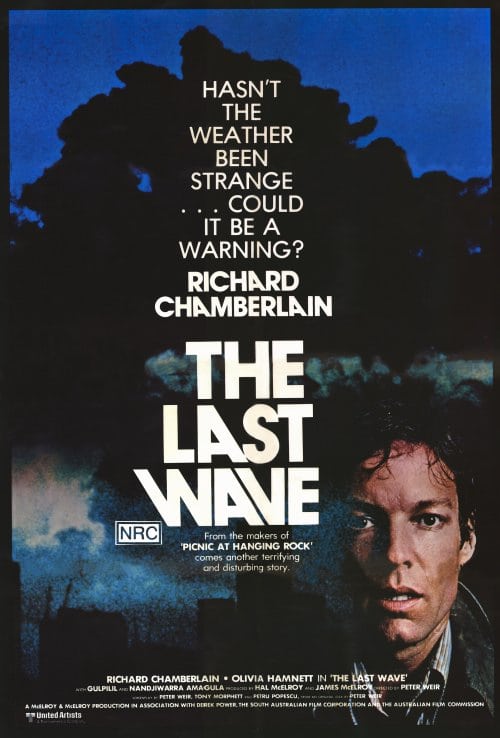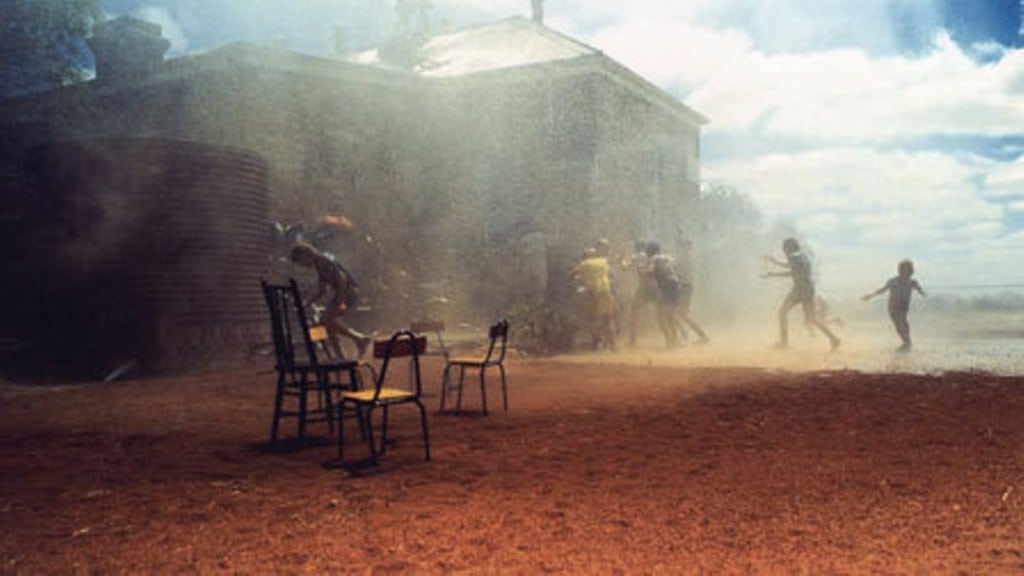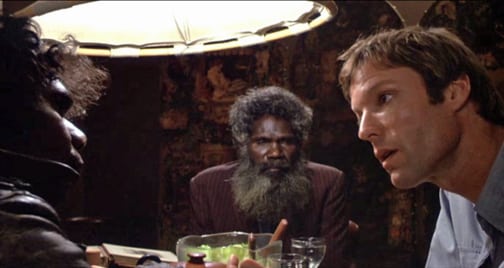Directed by: Peter Weir
Written by: Peter Weir, Tony Morphett
Starring: David Gulpilil, Frederick Parslow, Olivia Hamnett, Richard Chamberlain
HCF REWIND NO. 196: THE LAST WAVE [Australia, 1977]
AVAILABLE ON DVD
RUNNING TIME: 106 min
REVIEWED BY: Dr Lenera, Official HCF Critic
Adverse weather conditions seem to be happening all over Australia, something that the Aboriginals seem to recognise the significance of. During a freak rainstorm in Sydney, an altercation occurs among a group of Aboriginals in a pub, which results in the mysterious death of one of them. At the coroner’s inquest, the death is ruled a homicide and four men are accused of murder. Through the Australian Legal Aid system, lawyer David Burton is procured for their defence, but as the government doesn’t acknowledge that there are tribal people in the city, defending the men appears to be impossible. David efforts are also frustrated by the defendants, who refuse to cooperate. He begins to experience recurring dream images of one of the defendants Chris Lee and a mysterious older native….
There are times I think of The Last Wave as being a really scary film, especially its ending. It has a very unsettling atmosphere, some creepy scenes, and a premise which seems more and more frighteningly believable as our weather seems to be getting worse and worse, though it’s rarely actually considered a horror film. In many ways it’s a companion piece to director Peter Weir’s earlier Picnic At Hanging Rock, similarly suggesting many things rather than saying them, and delving into a world that the earlier film seemed to just lurk on the surface of, though it’s not quite as oblique. It’s similarly slow in a way that I guess would bore some first-time viewers today, and very visually dark throughout [the flip side to the bright Picnic At Hanging Rock], so much so that a copy I used to have of the film from TV was sometimes very hard to watch unless you had no other lights on in the house. I think it’s a fascinating film that is one of Weir’s strongest exploring of his favourite themes: the clash of cultures and the breaking of normal definitions of reality. As for genre, it’s hard to pigeon-hole, like many of the really original and intriguing films are. I supposed supernaturally-tinged mystery would be closest, though I’m still calling it a horror film, and sticking by it. If horror films are in part a way for us to confront our fears and our insecurities as well as frighten, than the increasingly pertinent The Last Wave certainly counts as one.
The Last Wave began production before Picnic At Hanging Rock had even had an American release, though it was a sensational success in Australia. Weir says the idea came to him when he asked himself: “What if someone with a pragmatic approach to life experienced a premonition?”. He wrote a script with Tony Morphett and American writer Petru Popescu, whose participation got United Artists interested, and they partly financed the project and gave Weir an American star, Richard Chamberlain, though for some reason World Northal Films ended up distributing it in the UUS, not UA, where it was re-titled Black Rain [well The Last Wave does sound a bit like a surfer film]. Weir insisted on actual tribal Aboriginals appearing in the film, native people who still live their lives according to strict Aboriginal law, and some improvised lines and ideas by them were used. The film was largely shot with the same crew as Picnic, while Adelaide doubled for the city of Sydney, though ironically at the time Sydney experienced harsh weather conditions with constant heavy rain, while such weather had to be recreated in Adelaide, which was sunny and pleasant during filming. The film was not quite the box office sensation locally that its predecessor was, but its modest run in the US did well enough for Picnic to finally be released there.
A common theme amidst Australian films, right from the 70’s which was the first decade in which Australia actually had a proper film industry, is Australian identity, and sometimes more explicitly the appalling situation of the Aboriginals, a native black race which, much like the Native Americans, has been partially destroyed and is now ruled by whites. Picnic hinted at a strange and mystical world of Aboriginal culture which the white colonists made no attempt to understand, and The Last Wave takes this further, though there is always the tantalising and maybe frustrating sense of looking in but not really understanding. The film goes into the nature of ‘Dream Time’, which according to the Aboriginals is a parallel reality that exists alongside what we see as reality, but we finish the film more mystified than when we started it. Something it does very well is to avoid sentimentalising Aboriginal culture in the P.C. fashion, where indigenous culture is usually portrayed as being superior to our awful, capitalist society. The film treats the Aboriginal world with respect, but remains a little distant, even fearful. The Aboriginal characters often seem rude and inconsistent, and their attitudes and laws hard to understand, even if they seem to possess a spiritual wisdom, real magic and the ability to foretell events to come. In particular, the character of Chris Lee, another strong role for that fine Aboriginal actor David Gulpilil who has been in so many films, just doesn’t seem to know what to do for much of the film. He’s torn between what his culture tells him to do, and what his brain tells him to do, an interesting parallel with the actor’s own life who often had a great deal of trouble combining a lengthy film career with a more traditional Aboriginal life.
The Last Wave opens with an Aboriginal drawing a symbol on a rock, then cuts to children calmly playing outside during school in what is a lovely, sunny day, when out of the blue comes rain and even huge hailstones, one of which even gores one of the children as it smashes through a window into the classroom into which they’ve been herded. What a striking beginning this is, immediately alerting to the viewer that something is askew with the world. For a while we seem to be a watching an odd mystery, as our lawyer hero tries to work out why an Aboriginal has been killed, but it’s a mystery into which unreality seems to slightly seep into. We are constantly reminded that water is everywhere, from the endless rain at night-time to water dripping down the stairs of David’s house. David keeps dreaming that he’s being visited by Aboriginals, one of whom seems to offer him a rock containing the same drawing that we saw at the beginning, and perhaps they’re watching the house in reality too. A lengthy scene has the camera prowl the house like a killer in a slasher film, while a didgeridoo plays on the soundtrack. Narratively it means nothing and is even gratuitous, but it tells us that magic is all around and David is part of something huge. And then, in a short scene which gobsmacked me first time round, David is in his car and, for a few seconds, is underwater and dead bodies are everywhere as Sydney has been submerged underwater. The scene is made all the more effective by being almost silent, in a film where silence is often more effective than noise.
Richard Chamberlain, rarely an actor I have a high opinion of, is quite superb throughout in registering befuddlement and eventually knowledge. The story moves slowly and refuses to indulge in pointless action, but for those willing to concentrate it’s very rewarding. It does give us a kind of narrative climax in which much is explained, and an absolutely terrifying final shot which may have been borrowed from a surfing documentary but which always chills me to the bone nonetheless. Some wonder what it really represents, though unlike some of the other things in the film it’s always been quite clear to me. From David maybe being some kind of ancient mystic to him seeing a mask of himself, elsewhere the story is filled with elements which are not properly explained but which the viewer is intended to have his or her own interpretations of, though I think a cursory look at Aboriginal mythology may be constructive. In any case, this film is crammed with ideas, if often more suggested than stated, like children having certain connections to things that are lost with adulthood, and some of its themes have turned up in quite a few films since. The basic plot, for example, has connections to Knowing, but I seemed to notice certain links with The Fountain on this viewing. The Last Wave is overflowing with ideas – it even seems to touch on global warming way before it became a major issue – and perhaps these ideas end up being too many, which is surprising when it’s such a leisurely, studied film.
The film has its flaws. Charles Wain’s electronic Jean Michel-Jarre-style score is sometimes a little annoying, a few scenes come across as being jarringly on the nose when compared with the ambiguity and subtlety of the rest, and the low budget occasionally shows more than it should, but it’s still quite a fascinating piece of work nonetheless that deserves to be better known. It’s perhaps Weir’s most underrated, a rare example of a film that both evokes the time it was made in and is still relevant today. It’s also a good example of a movie which may actually seem scarier after you’ve seen it rather than during. The next time I look out of the window and see yet more rain and see pictures of half of Somerset underwater, I know I’m going to have a chill go down my spine that moment.









Be the first to comment